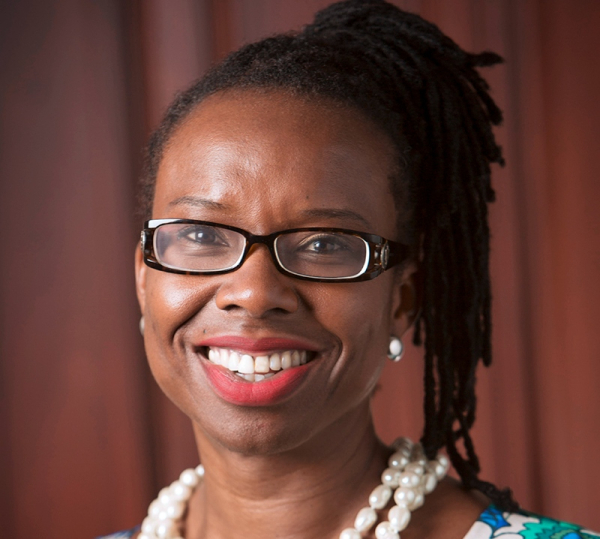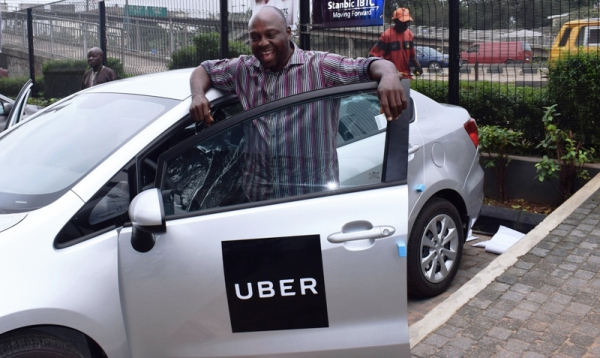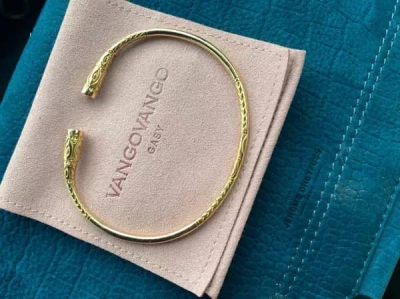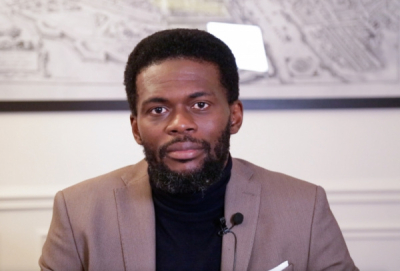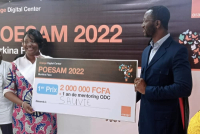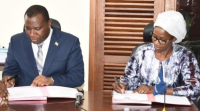Very much committed to fairness and gender issues, she leveraged her decades-long experience to develop a network that would advance her goals.
Tokunboh Ishmael (photo) is the co-founder and Managing Director of Alitheia Capital, an impact investment firm founded in 2007. In line with her ambition to invest “in equity, fairness, and inclusion to create wealth and transform lives,” Alitheia Capital’s support for African tech innovators has been growing over the years.
In 2015, she created Alitheia IDF, a US$100 million investment fund that finances SMEs led by gender-diverse teams, furthering her commitment to fairness and gender issues.
“Always drawn to uncharted waters, I was an early pioneer of impact investing, a visionary who saw the potential of Fintechs in Africa, and forged a path for injecting gender consciousness into the investment process,” her Linkedin about section reads.
Tokunboh Ishmael is an accomplished private equity manager. Her professional career started in 1988 when she joined Amerada Hess as a business analyst. She later assumed the same position at Citibank and BSG Consulting after that. From 1997 to 2000, she worked as an investment banker for Morgan Stanley before taking office as Sussex Place Ventures’ investment principal. In 2003, she left Sussex Place Ventures to join Aureos Capital, as a partner, in Nigeria. Two years later, the investment professional became the managing director of Avante Capital.
Upon leaving Avante Capital in 2007, she co-founded Alitheia Capital, which she now leads as the Managing director. Concurrently to her duties with her investment firm, from 2008 to 2011, she was the chairperson of the African Private Equity and Venture Capital Association (AVCA), a not-for-profit entity that “promotes, develops, and stimulates private equity and venture capital in Africa.”
Melchior Koba
Since its arrival in the South African market nine years ago, Uber has gradually expanded its services on the continent covering eight other countries. In the coming years, it plans to add more to its continental markets.
US ride-hailing company Uber announced, Tuesday, September 6, its launch in eight African cities with new products and features. According to the company's statement, the cities are located in Nigeria, South Africa, Ghana, Kenya and Ivory Coast, where it already operates.
“As we prepare to celebrate our 10th anniversary next year, we’re excited to move into more cities so people can go wherever they want and get whatever they want. Our commitment to raising the bar on safety remains unwavering, and we continue to work hard to grow the more than 3 million earning opportunities we’ve created so far,” said Kagiso Khaole, general manager of Uber Sub-Saharan Africa.
The company's expansion into new markets comes with the introduction of new services such as UberX Share, Uber ChapChap Share, UberXL, UberXL Reserve and Uber Van Reserve. The new services offer riders the opportunity to save up to 30 percent off the normal ride price. Some services such as UberXL Reserve and Uber Van Reserve will allow riders to book their group trips 30 days in advance.
Since its arrival in Africa in August 2013, Uber has been steadily rolling out new features to attract customers. Three new safety features will be announced in the coming months, including audio recording (in South Africa), we learn. The audio recording feature will allow users and drivers to record and share audio during the ride to serve as evidence in case of safety incidents.
Uber's presence in these eight new cities - namely Owerri and Akure in Nigeria; Eldoret, Kisumu, Nakuru, and Naivasha in Kenya; and Tamale and Sunyani in Ghana - will create new economic opportunities in Africa.
In an article published on May 26, 2022, by South African Daily Maverick, Mpho Sebelebele, Uber's communications manager for South Africa, indicated that the ride-sharing company has created more than six million economic opportunities in over 50 sub-Sarahan African cities since 2013.
Samira Njoya
In its latest e-government development index, the United Nations ranks Morocco among the best in Africa. As they are aware that there is still room for progress, the country’s authorities are making more investments to improve their public services.
Morocco, through the Agency for Digital Development (ADD), recently launched its e-government interoperability platform. This platform aims to facilitate secure and transparent data and document exchange between public administrations, agencies, and institutions.
With the interoperable platform, the country wants to streamline its processes and make its services more suited to meet residents’ expectations. Thanks to the platform, public administrations, institutions, and agencies can exchange information even if they use different information systems.
"Interoperability between the various IT systems reduces processing cycles and makes previously issued documents available to every connected administration. It also reduces human errors and costs,” explained Minsait -which developed the interoperability platform- in a release dated Monday, September 5.
The platform is one of the Moroccan government’s investments for its digital transformation ambition. In its digital strategy, the country wants to increase the percentage of citizens and businesses satisfied by public services to 85% by 2025. To do so, it plans to transform how they interact with the government by digitizing end-to-end citizen/business priority services.
Currently, the Single Social Register (RSU), the MASSAR school management system, and some social programs are operational on the Interoperability Platform, which is an open "Internet of Things" (IoT) system with Big Data capabilities.
It enables simple integration and the exchange of information from different systems, applications, and devices. It also facilitates encryption to protect data confidentiality and integrity.
Muriel Edjo
Thanks to online stores, people can sell their products to more people than they could with conventional methods. Vangovango wants to capitalize on this opportunity to showcase Malagasy ancestral bracelets and jewelry.
Vangovango is an e-commerce platform developed by Malagasy jewelry store Vangovango Gasy, founded in 2018 by Diana Chamia Anjarasao. It allows artisans to sell ancestral Malagasy jewelry made of noble materials.
“Vangovango Gasy was born out of the desire to showcase the Malagasy ancestral bracelet. However, the adventure led us to offer other types of jewelry (necklaces, rings, etc) besides bracelets. My initial goal was to offer a modernized Vangovango. The old style of VangoVango is fine and we do list those types on our online store but, we believed that it was necessary to offer new styles to distinguish ourselves. [...] I am lucky I know how to draw and I am also creative. I generate ideas from my life and my surroundings. Sometimes, I visit museums and attend garage sales in Latin Quarter [in Paris] to hunt for creative ideas. I also visit Maisons-Laffitte and charm sellers at the Diego Suarez market,” indicates Diana Chamia Anjarasoa.
The ecommerce platform showcases pictures of gold, silver, or Sapphire jewelry made by Malagasy artisans. To buy from Vangovango, users need to register on the platform. Let’s note that delivery is free for purchases worth more than €50. Also, the store’s delivery deadlines are a bit long. Depending on the geographic area, it can go from three to sixteen days.
Buyers can pay for their order via numerous means, including Paypal or bank transfer. There is also the option to buy and pay by installments (four installments overall). In 2022, Diana Chamia was selected among the Africa Business Heroes’ top 50 heroes.
Adoni Conrad Quenum
For the Togolese entrepreneur, in Togo, residents can create sustainable solutions to meet their own needs. To help them do so, he created an enabling framework that earned the trust of many entrepreneurs and birthed interesting projects.
Sénamé Koffi Agbodjinou (photo) is the founder of le WoeLab, Togo’s first fablab. The fab lab, created in 2012, hosts, trains, and accelerates the startups’ high-value-added projects. For the founder, WoeLab -a section of the Hub City (a smart city adapted to African realities) launched by his NGO Africaine d'Architecture- is a framework that enables everyone to “invest to realize their creative potentials.”
Kofi Agbodjinou’s approach to developing entrepreneurs’ potential has seduced numerous innovative project leaders. Urbanattic, Woebots, SysWoe, and Scope are some of the startups incubated by WoeLab.
One of the major projects incubated by the fablab is possibly W.Afate 3D Printer, the first African 3D printer made from electronic waste.
Thanks to his various ventures, Sénamé Koffi Agbodjinou acquired international credibility with many organizations commissioning him to organize tech events like the Nasa International Space Apps Challenge, the FabJam, the Arduino Day, the Global Data Fest, the Hack4Dev, the Open Source Circular Economy Days, etc.
Apart from those tech events, Koffi Agbodjinou, through WoeLab, also leads the Open Street Map Togo, JerryClan-Togo, ArchiCamp, BlogCamp Togo, and BootWoeCamp communities.
Melchior Koba
Thanks to the technological revolution, the African delivery sector is more dynamic than ever and local entrepreneurs are developing more solutions to help residents and businesses.
Boxconn is a digital solution developed by an eponymous Ghanaian startup. It handles first and last-mile delivery, enabling businesses to quickly deliver their orders.
The startup, which developed the solution, was founded in 2020 by Emmanuel Asamoah, Hafeez Babatunde, Ibrahima Mounkoro, and Nimrod Kgosimore. Since its launch, it has raised US$100,000 to upgrade its solution and expand to additional markets. According to its co-founder Emmanuel Asamoah, Boxconn was founded because the team “realized that businesses needed a central platform to manage all their logistics while getting delivery orders through their very own channels.”
The solution saves businesses of all sizes “a lot [more than US$100,000 per company figures] and helps them build stronger relationships with their clients,” he adds.
Boxconn connects businesses and motorcycle dispatch riders, delivery vans, and cars. It offers 24/7 support, insurance for each delivery booked through its platform until they arrive at their destination, and live delivery updates. Currently, it claims more than 30,000 deliveries processed for 120 businesses.
To improve its services, the startup plans to introduce drone services. For that purpose, it has initiated discussions with potential partners. Boxconn is already active in Nigeria and Botswana. It also plans to enter Mali and add morwe African markets by 2023.
Adoni Conrad Quenum
E-commerce has been booming in Africa over the past few years. To support commercial enterprises in their digital transformation, El-dokan provides them with highly flexible and customizable technological infrastructures.
Egyptian enterprise software solution provider El-dokan announced, Monday (September 5), the close of a US$550,000 pre-seed round to establish its international presence. The round was led by a cluster of local and regional investors including EFG EV and Flat6Labs, 500 Global, and Hala Ventures.
Apart from helping establish its international presence, the funds will also help El-Dokan upgrade its technology. "We already succeeded in establishing a legal entity in Saudi Arabia to expand our sales and marketing activities across the GCC [ed. note: the Cooperation Council for the Arab States of the Gulf]. This expansion should be followed by the South African market, after building a strong footprint in the Mena region," an El-Dokan representative told Middle Eastern media The National.
According to the International Trade Centre's (ITC) recent report on African ecommerce potential, Egypt is among the ten countries that account for 94% of online activities in Africa. During the coronavirus pandemic, the number grew significantly and ecommerce has become an essential component of the country’s business strategy. For data platform ecommerceDB, an estimated US$5.2 billion in ecommerce revenues were generated in Egypt.
El-Dokan is already a leader in the MENA region. But, it wants to capitalize on the growing adoption of ecommerce to reinforce its position on the African continent. Since 2014, the company has been providing application programming interfaces (APIs) to large and medium-sized retailers, as well as startups, enabling them to build highly customized and tailored e-commerce stores. The company also helps them "drive sales growth while simultaneously bringing down maintenance costs [and helps achieve] the highest levels of operational efficiency," says Mohamed Yousry, CTO and co-founder of El-dokan.
To date, the company estimates that its customers have grossed US$45 million. El-dokan also claims collaboration with several international clients such as Procter & Gamble (P&G), Misr Pharmacies, Mobily, Zahran stores, and Apple Premium Switch Plus seller, as well as food delivery app Appetito.
Samira Njoya
The digital and mobile ecosystems are important tools that can help Africa achieve sustainable development goals. Indeed, apart from the jobs they can create, they can also improve education, health, and governance. That is why, in recent years, numerous projects are implemented to capitalize on the opportunities offered by those ecosystems.
The GSM Association (GSMA) and German Cooperation Agency (GIZ) recently issued a call for applications for the Platforms for Tomorrow acceleration program under the Mobile Innovation Hub jointly implemented in Tunisia since 2020.
The aim of the acceleration program is to support innovators that develop platforms to act as a bridge between supply and demand while facilitating social, economic, and human development. Applications are open till September 25, 2022.
The main targets of the 6-month acceleration program (October 2022- March 2023) are applicants whose solutions have active users, early sales, or already launched products. The solutions must also have strong social and economic impacts.
The program is also interested in solution developers with a potentially scalable product or service that has a significant total addressable market. It also targets innovators willing to improve the quality, performance, and well-being of their employees by offering dedicated training and solutions that have “potential for synergy with Mobile Network Operators (telecoms).”
Muriel Edjo
Orange issued calls for applications for the national phase of its social venture prize in Burkina Faso, on March 28, 2022. It received over 500 applications but only ten were selected to present their projects to the jury.
Last Friday, September 2, Burkinabe startup AINO Digital SAS’ digital identity project Sauvie won the first prize in the national phase of the Orange Social Venture Prize (POESAM) in Ouagadougou. The startup, founded by Scarlett Zongo (photo, left), thus won a check of XOF2 million. The second (Diabète contrôle) and third (Alliance Pharma) winners went home with respective checks of XOF1.5 million and XOF1 million.
The digital identity project, which won the first prize, is a bracelet with an ornament that is embedded with a QR Code. The QR code contains the wearer’s health information and emergency contacts. It, therefore, gives all the information needed to receive first aid when the need arises.
“We started working on the project in 2018 and finally launched it in February 2022. Since its launch, we have received important support from the national fire agency and the Ministries of Defence and Territorial Administration. We were able to work with those institutions to fine-tune Sauvie so that it can be able to address the issues faced by our societies,” indicated Scarlett Zongo.
Orange launched its POESAM awards, twelve years ago, to support startups that offer useful solutions to the population. This year, Burkina Faso has organized its fifth national phase, receiving more than 500 applications. During the national phase, a women entrepreneurs prize was also awarded. It was received by the founder of Women Health, who won a check of XOF1.5 million and one year of mentoring at the Orange Digital Center.
Let's note that the three winners of the national POESAM edition will take part in the international phase against the winners of sixteen other countries.
Adoni Conrad Quenum
Information and communications technologies have become vital tools in every sector nowadays. From democratized internet to digitized networks, they all have their importance and are strong allies in the transformation of economies. Burundi wants to capitalize on those technologies to efficiently implement its 2018-2027 national development plan.
Burundi will soon kick off the digitization of its public services. For that purpose, last Thursday, August 29, it signed a US$50 million financing agreement with the World Bank. The agreement was signed by the Minister of Finance, Domitien Ndihokubwayo (photo, left), and the World Bank's Resident Representative in Burundi, Hawa Cissé Wagué (photo, right).
According to Minister Domitien Ndihokubwayo, the agreement is an opportunity for the government to raise additional resources to dedicate to its e-government ambitions, allowing the achievement of planned development projects.
This funding will allow the country to install high-speed Internet connections, digitize its education sector, provide an internet connection to rural populations and improve public services. It will also enable the government to provide basic computer training to women and the less privileged.
According to the World Bank, Burundi has an excellent national ICT development policy but the institutions tasked with the implementation of that policy lack the capacity to do so. To date, only a few of the set targets have been achieved. The 5-year program funded by the World Bank financing aims to address the situation. The first project the government wants to implement for that purpose is the elaboration of a legal personal data protection framework.
According to the World Bank representative in Burundi, this project will support the government in the implementation of its digital vision defined in the 2018-2027 National Development Plan, which aims to transform Burundi’s economy.
Samira Njoya
More...
Digital transformation is accelerating in Africa, forcing public administrations and private companies to adapt. However, there is a shortage of local skilled experts to support that transformation. Hence an urgent need to train a qualified workforce.
From September 1 to 30, 2022, applications are open for Power Learn Project’s one million software developers program in South Africa.
According to Mumbi Ndung'u, Power Learn Project’s chief growth and operations officer, through its “one million software developers” program, Power Learn Project’s goal is “to drive transformative change for the youth of Africa through technology skilling.”
“The program will offer online junior software development training [... as well as soft skills component in employability, entrepreneurship, and their mental well-being [...]to enable the learners to not only acquire entry-level smart technology jobs but to also be wholesome members of the community,” he added.
At the end of the 4-month learning program, participants will receive certificates proving they have completed the courses. This is the second cohort of the “one million software developers for Africa”. The first cohort was launched in Kenya, in June 2022. In the coming months, more cohorts will be launched in Zambia, Nigeria, Ghana, Rwanda, and Uganda.
In its "Africa Developer Ecosystem Report 2021" published on February 21, Google reveals that the demand for developers is growing worldwide, especially in Africa. Indeed, the ongoing digital transformation has boosted the need for developers and the continent may experience a shortage of professional developers if it fails to take adequate measures. That is why Power Learn Project wants to help train the next generation of developers who will support Africa in its digital transformation efforts.
Muriel Edjo
In recent years, African tech entrepreneurs have developed several digital tools to help businesses reach their full potential. This is the case of Kenyan startup Boya which has developed an interesting solution that helps businesses track employee expenditures.
Boya is a fintech solution developed by a Kenyan firm Boya Inc. It allows businesses to issue Visa expense cards and track the expenditures made from those cards via its web and mobile (Android and iOS) apps.
In addition to giving businesses a real-time overview of employee spending and allowing them to quickly activate or deactivate expense cards, the fintech solution offers instant overdraft when needed. The overdraft limit increases proportionally to the transactions made by requesters through Boya.
To quickly address client issues, Boya Inc, which was founded in 2019, has a 24/7 support service for Boya users.
Let’s note that the Kenyan startup has been selected to participate in the 2022 Winter cohort of Californian accelerator Y Combinator. The program is an opportunity for Boya to find additional capital besides the financing it will receive from Y Combinator.
Adoni Conrad Quenum
In recent years, delivery services have popped up in major cities across Africa. They take last-mile delivery to another level, allowing their users to order almost everything and get them delivered to their doorsteps. Nigerian entrepreneurs have decided to do the same by delivering food to busy individuals.
Heyfood is a digital solution developed by an eponymous Nigerian start-up. It allows users to order foods from multiple restaurants.
The solution has a mobile app accessible on Android and iOS. On registration, users can browse the available restaurants, order the foods they want and get them delivered as quickly as possible.
Restaurants can also register on the platform to reach a broader client base. Using integrated features, they can manage and process orders and seamlessly receive payments. It also allows individuals to earn extra income by delivering orders.
Let’s note that Heyfood, an Ibadan-based startup founded in 2021, collects US$1 per order delivered. Its Android app has been downloaded more than 10,000 times. Currently, it is rated 3.9 out of 5 on Playstore. In 2022, the startup was selected to participate in the winter cohort of Californian accelerator Y Combinator.
Adoni Conrad Quenum
Although not yet popular, online shopping is gradually getting into people’s habits in Africa, thanks notably to the Covid-19 pandemic. The sector is attracting a growing volume of state investments since it is perceived as an opportunity to reach foreign markets.
Nigeria wants to improve national e-commerce revenues to US$75 billion by 2025, up from US$13 billion currently. During a stakeholder dialogue on e-commerce and digital trade policy last weekend, Suleman Audu, Nigerian Ministry of Industry’s Director of Commodities, indicated that the government was already making the required investments to achieve the goal.
“The Federal Government is [...] committed to developing an e-commerce strategy in line with the Federal Government’s Post COVID-19 recovery plan, to encourage investment in the e-commerce value chain,” he said.
He also admitted that “Nigeria is yet to fully harness the inherent opportunities in the e-commerce value chain, largely due to inadequate investment, coupled with inadequate information on the opportunities in the sector and the inability of Government to provide the required enabling environment.”
By increasing e-commerce revenues, the country wants to reduce oil dependence in line with economic diversification calls from the UNECA and the World Bank. According to the UNCTAD 2020 B2C e-commerce index, Nigeria was the eighth best e-commerce market in Africa and the 94th globally.
Muriel Edjo


